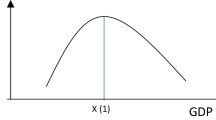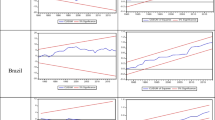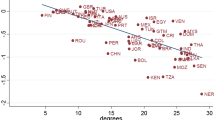Abstract
Despite growing concern about the low-carbon economic development, little is known about the role of political institutions, democracy, or the absence thereof, in controlling carbon intensity (carbon dioxide emissions per unit of GDP). This paper estimates the causal effects of democratic transition in Indonesia on its national carbon emission intensity. The synthetic control method is adopted to handle both time-invariant and time-variant confounding heterogeneity. Results show that Indonesia’s democratic transition increases on average 0.24 kg carbon dioxide emissions per constant 2005 US dollar in the post-transition period (1999–2010), a rise of approximately 25.34%. The placebo tests indicate this causal effect is significant and the leave-one-out sensitivity check also demonstrates its robustness. The evidence of Indonesia suggests that democratic transition may serve to intensify, rather than mitigate, the emissions of carbon dioxide. Therefore, policymakers should pay more attentions to the contextual fit of democratic transition.



Similar content being viewed by others
Notes
This report can be downloaded from the official website of IPCC. See https://www.ipcc.ch/pdf/assessment-report/ar5/wg3/ipcc_wg3_ar5_summary-for-policymakers.pdf.
It needs to be mentioned that causal inference research is not to prove causation, but to identify the impact of exposure to a particular treatment or program. For example, Rothman and Greenland (2005) discuss the causality and causal inference in epidemiology and argue that “philosophers agree that causal propositions cannot be proved, and find flaws or practical limitations in all philosophies of causal inference. Hence, the role of logic, belief, and observation in evaluating causal propositions is not settled. Causal inference in epidemiology is better viewed as an exercise in measurement of an effect rather than as a criterion-guided process for deciding whether an effect is present or not.”
The methodology report and dataset can be downloaded from the official website of Freedom House. https://freedomhouse.org/report/freedom-world/freedom-world-2017
This research implements SCM with the R package “MSCMT” (Becker and Klößner 2018).
References
Abadie A, Gardeazabal J (2003) The economic costs of conflict: a case study of the Basque Country. Am Econ Rev 93:113–132
Abadie A, Diamond A, Hainmueller J (2010) Synthetic control methods for comparative case studies: estimating the effect of California’s tobacco control program. J Am Stat Assoc 105:493–505. https://doi.org/10.1198/jasa.2009.ap08746
Abadie A, Diamond A, Hainmueller J (2015) Comparative politics and the synthetic control method. Am J Polit Sci 59:495–510. https://doi.org/10.1111/ajps.12116
Adams S, Adom PK, Klobodu EKM (2016) Urbanization, regime type and durability, and environmental degradation in Ghana. Environ Sci Pollut Res 23:23825–23839. https://doi.org/10.1007/s11356-016-7513-4
Antlöv H, Brinkerhoff DW, Rapp E (2010) Civil society capacity building for democratic reform: experience and lessons from Indonesia. Volunt Int J Volunt Nonprofit Org 21:417–439. https://doi.org/10.1007/s11266-010-9140-x
Arvin MB, Lew B (2011) Does democracy affect environmental quality in developing countries? Appl Econ 43:1151–1160. https://doi.org/10.1080/00036840802600277
Aspinall E (2014) Health care and democratization in Indonesia. Democratization 21:803–823. https://doi.org/10.1080/13510347.2013.873791
Bandiera O, Levy G (2011) Diversity and the power of the elites in democratic societies: evidence from Indonesia. J Public Econ 95:1322–1330. https://doi.org/10.1016/j.jpubeco.2011.04.002
Barrett S, Graddy K (2000) Freedom, growth, and the environment. Environ Dev Econ 5:433–456. https://doi.org/10.1017/S1355770X00000267
Barro RJ, Lee JW (2013) A new data set of educational attainment in the world, 1950–2010. J Dev Econ 104:184–198. https://doi.org/10.1016/j.jdeveco.2012.10.001
Becker M, Klößner S (2018) Fast and reliable computation of generalized synthetic controls. Econ Stat 5:1–19. https://doi.org/10.1016/j.ecosta.2017.08.002
Beeson M (2010) The coming of environmental authoritarianism. Environ Pol 19:276–294. https://doi.org/10.1080/09644010903576918
Bernauer T, Koubi V (2009) Effects of political institutions on air quality. Ecol Econ 68:1355–1365. https://doi.org/10.1016/j.ecolecon.2008.09.003
Bhattacharyya SC, Ussanarassamee A (2004) Decomposition of energy and CO2 intensities of Thai industry between 1981 and 2000. Energy Econ 26:765–781. https://doi.org/10.1016/j.eneco.2004.04.035
Birdsall C (2016) The synthetic control method for comparative case studies: an application estimating the effect of managerial discretion under performance management. Int Public Manag J 20:49–77. https://doi.org/10.1080/10967494.2015.1121178
Boix C, Miller M, Rosato S (2013) A complete data set of political regimes, 1800–2007. Comp Polit Stud 46:1523–1554. https://doi.org/10.1177/0010414012463905
Buitenzorgy M, Mol A (2010) Does democracy lead to a better environment? Deforestation and the democratic transition peak. Environ Resour Econ 48:59–70
Chang YS, Choi D, Kim HE (2017) Dynamic trends of carbon intensities among 127 countries. Sustainability 9:2268. https://doi.org/10.3390/su9122268
Dong F, Long R, Li Z, Dai Y (2016) Analysis of carbon emission intensity, urbanization and energy mix: evidence from China. Nat Hazards 82:1375–1391. https://doi.org/10.1007/s11069-016-2248-6
Ebohon OJ, Ikeme AJ (2006) Decomposition analysis of CO2 emission intensity between oil-producing and non-oil-producing sub-Saharan African countries. Energ Policy 34:3599–3611. https://doi.org/10.1016/j.enpol.2004.10.012
Fan Y, Liu L-C, Wu G, Tsai HT, Wei YM (2007) Changes in carbon intensity in China: empirical findings from 1980–2003. Ecol Econ 62:683–691. https://doi.org/10.1016/j.ecolecon.2006.08.016
Farzin YH, Bond CA (2006) Democracy and environmental quality. J Dev Econ 81:213–235. https://doi.org/10.1016/j.jdeveco.2005.04.003
Fredriksson GP, Svensson J (2003) Political instability, corruption and policy formation: the case of environmental policy. J Public Econ 87:1383–1405. https://doi.org/10.1016/S0047-2727(02)00036-1
Fukuoka Y (2013a) Oligarchy and democracy in post-Suharto Indonesia. Pol Stud Rev 11:52–64. https://doi.org/10.1111/j.1478-9302.2012.00286.x
Fukuoka Y (2013b) Indonesia’s ‘democratic transition’ revisited: a clientelist model of political transition. Democratization 20:991–1013. https://doi.org/10.1080/13510347.2012.669894
Fukuyama F (2014) States and democracy. Democratization 21:1326–1340. https://doi.org/10.1080/13510347.2014.960208
Gaarder AR, Vadlamannati KC (2017) Does democracy guarantee (de) forestation? An empirical analysis. Int Area Stud Rev 20:97–121
Guan D, Klasen S, Hubacek K et al (2014) Determinants of stagnating carbon intensity in China. Nat Clim Change 4:1017–1023. https://doi.org/10.1038/nclimate2388
Heilbroner RL (1974) An inquiry into the human prospect. W. W. Norton, New York
Herzog T, Baumert KA, Pershing J (2006) Target--intensity: an analysis of greenhouse gas intensity targets. World Resources Institute, Washington
Holland PW (1986) Statistics and causal inference. J Am Stat Assoc 81:945–960. https://doi.org/10.2307/2289064
Holmberg S, Rothstein B, Nasiritousi N (2009) Quality of government: what you get. Ann Rev Polit Sci 12:135–161. https://doi.org/10.1146/annurev-polisci-100608-104510
Imbens GW, Rubin DB (2015) Causal inference for statistics, social, and biomedical sciences: an introduction, 1st edn. Cambridge University Press, New York
Kretschmer B, Hübler M, Nunnenkamp P (2013) Does foreign aid reduce energy and carbon intensities of developing economies? J Int Dev 25:67–91. https://doi.org/10.1002/jid.1788
Li Q, Reuveny R (2006) Democracy and environmental degradation. Int Stud Q 50:935–956
Mayer A (2017) Will democratization save the climate? An entropy-balanced, random slope study. Int J Sociol 47:81–98. https://doi.org/10.1080/00207659.2017.1300465
Midlarsky MI (1998) Democracy and the environment: an empirical assessment. J Peace Res 35:341–361. https://doi.org/10.1177/0022343398035003005
Morgan SL, Winship C (2014) Counterfactuals and causal inference: methods and principles for social research, 2nd edn. Cambridge University Press, New York
Ophuls W (1977) Ecology and the politics of scarcity. W.H. Freeman, San Francisco
Payne RA (1995) Freedom and the environment. J Democr 6:41–55. https://doi.org/10.1353/jod.1995.0053
Policardo L (2016) Is Democracy Good for the Environment? Quasi-Experimental Evidence from Regime Transitions. Environ Resour Econ 64:275–300. https://doi.org/10.1007/s10640-014-9870-0
Roberts JT, Grimes PE (1997) Carbon intensity and economic development 1962–1991: a brief exploration of the environmental Kuznets curve. World Dev 25:191–198. https://doi.org/10.1016/S0305-750X(96)00104-0
Rosenbaum PR, Rubin DB (1983) Assessing sensitivity to an unobserved binary covariate in an observational study with binary outcome. J R Stat Soc Ser B Methodol 45:212–218
Rothman KJ, Greenland S (2005) Causation and causal inference in epidemiology. Am J Public Health 95:S144–S150. https://doi.org/10.2105/AJPH.2004.059204
Rubin DB (1974) Estimating causal effects of treatments in randomized and nonrandomized studies. J Educ Psychol 66:688–701. https://doi.org/10.1037/h0037350
Rubin DB (1980) Bias reduction using Mahalanobis-metric matching. Biometrics 36:293–298. https://doi.org/10.2307/2529981
Steinberg PF, VanDeveer SD (eds) (2012) Comparative environmental politics: theory, practice, and prospects. The MIT Press, Cambridge
Stuart EA (2010) Matching methods for causal inference: a review and a look forward. Stat Sci 25:1–21. https://doi.org/10.1214/09-STS313
Teorell J, Dahlberg S, Holmberg S, et al (2017) The quality of government standard dataset, version Jan17. In: httpwww.qog.pol.gu.se doi.QoGStdJan. Accessed 5 Nov 2017
Thomakos DD, Alexopoulos TA (2016) Carbon intensity as a proxy for environmental performance and the informational content of the EPI. Energ Policy 94:179–190. https://doi.org/10.1016/j.enpol.2016.03.030
Winslow M (2005) Is democracy good for the environment? J Environ Plan Manag 48:771–783. https://doi.org/10.1080/09640560500183074
Xu XY, Ang BW (2013) Index decomposition analysis applied to CO2 emission studies. Ecol Econ 93:313–329. https://doi.org/10.1016/j.ecolecon.2013.06.007
You W-H, Zhu H-M, Yu K, Peng C (2015) Democracy, financial openness, and global carbon dioxide emissions: heterogeneity across existing emission levels. World Dev 66:189–207. https://doi.org/10.1016/j.worlddev.2014.08.013
Zhang Y-J, Liu Z, Zhang H, Tan T-D (2014) The impact of economic growth, industrial structure and urbanization on carbon emission intensity in China. Nat Hazards 73:579–595. https://doi.org/10.1007/s11069-014-1091-x
Zhu Z-S, Liao H, Cao H-S, Wang L, Wei YM, Yan J (2014) The differences of carbon intensity reduction rate across 89 countries in recent three decades. Appl Energy 113:808–815. https://doi.org/10.1016/j.apenergy.2013.07.062
Acknowledgements
The author thanks Richard P. Balme and the anonymous reviewer for their valuable comments.
Funding
This work was supported by China Scholarship Council (CSC) [NO.201708330099].
Author information
Authors and Affiliations
Corresponding author
Ethics declarations
Conflict of interest
The author declares that there is no conflict of interest.
Additional information
Responsible editor: Philippe Garrigues
Rights and permissions
About this article
Cite this article
Mao, Y. Does democratic transition reduce carbon intensity? Evidence from Indonesia using the synthetic control method. Environ Sci Pollut Res 25, 19908–19917 (2018). https://doi.org/10.1007/s11356-018-2165-1
Received:
Accepted:
Published:
Issue Date:
DOI: https://doi.org/10.1007/s11356-018-2165-1




